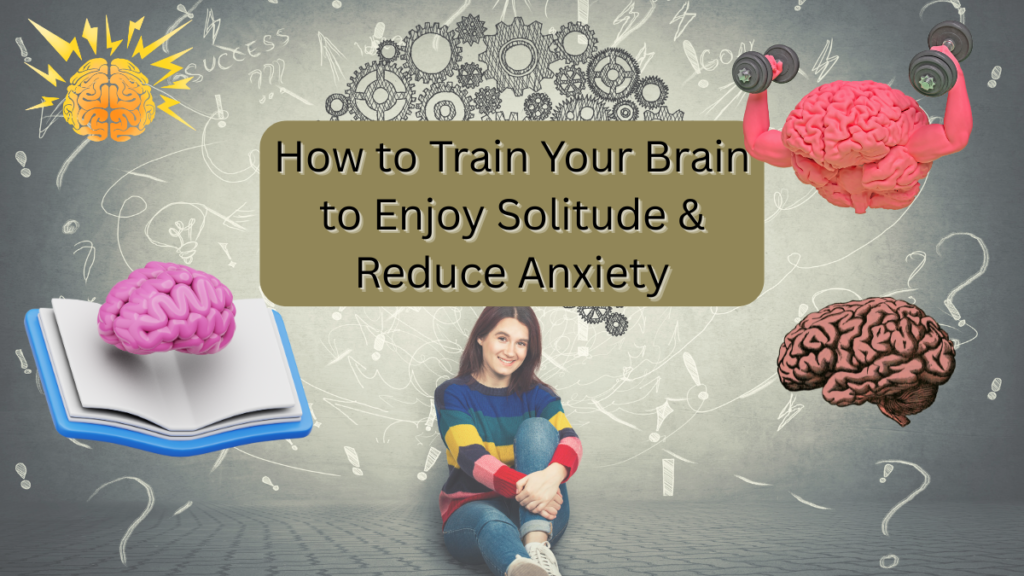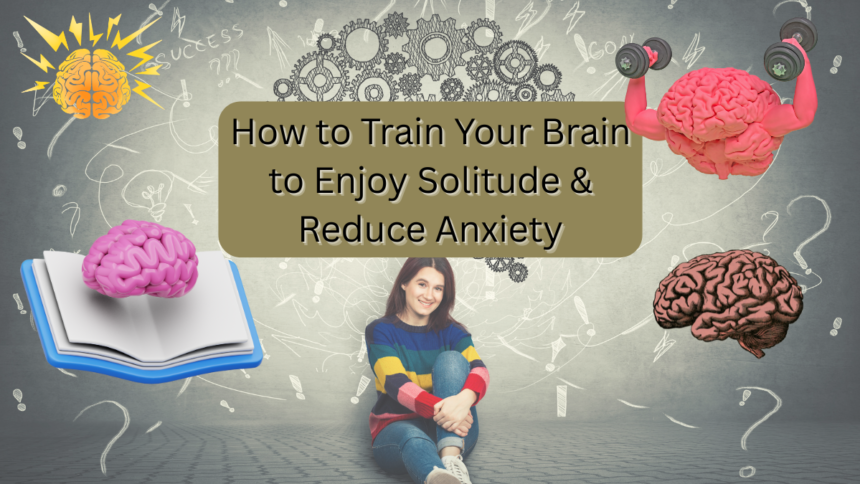Train Your Brain
In today’s fast-paced world, many of us struggle with constant noise—both external and internal. The fear of missing out (FOMO), social media overload, and the pressure to always be “on” can leave us feeling drained and anxious. But what if solitude, often mistaken for loneliness, could actually be a source of peace and mental clarity?
Learning to enjoy alone time is a skill—one that can significantly reduce anxiety and improve overall well-being. In this post, we’ll explore practical ways to train your brain to embrace solitude, find joy in quiet moments, and ease anxious thoughts.

Why Solitude is Powerful (And Why It Scares Us)
Before diving into how to enjoy solitude, it’s important to understand why it’s valuable—and why so many people resist it.
The Benefits of Solitude
- Reduces anxiety & overstimulation – Constant social interaction and digital distractions keep our brains in a heightened state. Solitude allows the nervous system to reset.
- Boosts creativity & problem-solving – Some of history’s greatest thinkers (Einstein, Nietzsche, Virginia Woolf) credited solitude for their breakthroughs.
- Improves self-awareness – Being alone helps you tune into your thoughts and emotions without external influence.
Why We Fear Being Alone
Humans are social creatures, so solitude can feel uncomfortable at first. Many associate it with loneliness, boredom, or even existential dread. But solitude ≠ loneliness. Loneliness is a negative emotional state, while solitude is a choice—one that can be deeply fulfilling.
How to Train Your Brain to Enjoy Solitude
1. Start Small & Gradually Increase Alone Time
If solitude feels intimidating, begin with short periods:
- 10 minutes of quiet coffee time in the morning
- A brief walk without headphones
- A “digital detox” hour before bed
Over time, extend these moments. Your brain will adapt and start associating solitude with relaxation rather than anxiety.
2. Reframe Solitude as Self-Care
Instead of thinking, “I’m alone because no one wants to be with me,” shift to:
- “I’m giving myself space to recharge.”
- “This is my time to reflect and grow.”
Research shows that people who view solitude as productive rather than punishing experience lower stress levels (source).
Video Credits
3. Engage in Solo Activities You Love
Solitude becomes enjoyable when paired with fulfilling activities:
- Reading a book
- Journaling your thoughts
- Painting, drawing, or crafting
- Cooking a new recipe
- Practicing mindfulness or meditation
These activities keep your mind engaged while reinforcing positive associations with alone time.
4. Practice Mindfulness & Meditation
Anxiety often stems from overthinking the past or future. Mindfulness brings you back to the present. Try:
- Deep breathing exercises (inhale for 4 sec, hold for 4, exhale for 6)
- Body scan meditation (focus on relaxing each body part)
- Nature immersion (sit outside and observe sounds, smells, textures)
Studies show that mindfulness reduces anxiety by up to 38% (Harvard Health).
5. Limit Digital Dependence
Scrolling endlessly on social media can make solitude feel empty. Instead:
- Set screen-time limits
- Replace passive scrolling with active hobbies
- Try a “no-phone” hour daily
This helps break the cycle of needing constant external stimulation.
6. Challenge Negative Self-Talk
If your inner voice says, “Being alone means I’m unlikable,” counter it with:
- “I enjoy my own company.”
- “Solitude helps me grow.”
Cognitive Behavioral Therapy (CBT) techniques can help reframe these thoughts (Mayo Clinic).
7. Use Solitude for Reflection & Growth
Instead of avoiding quiet moments, use them to:
- Write down your goals
- Reflect on recent experiences
- Practice gratitude journaling
This turns solitude into a tool for personal development.
Common Concerns About Solitude
“What if I feel lonely?”
Loneliness and solitude are different. If loneliness creeps in, acknowledge it without judgment. Call a friend later, but first, sit with the feeling—it often passes.
“I get bored easily.”
Boredom can be a gateway to creativity. Let your mind wander instead of filling every second with distractions.
“I associate solitude with sadness.”
This is common if past alone time was linked to negative experiences. Gradually reintroduce solitude in positive ways to rewire the association.
Final Thoughts: Embrace the Quiet
Solitude isn’t about isolation—it’s about reconnecting with yourself. By training your brain to enjoy alone time, you reduce anxiety, boost creativity, and cultivate inner peace. Start small, be patient, and remember: the most meaningful relationship you’ll ever have is the one with yourself.
Your Next Step:
Try one solitude practice today—whether it’s a 10-minute meditation or a phone-free walk. Share your experience in the comments below!










